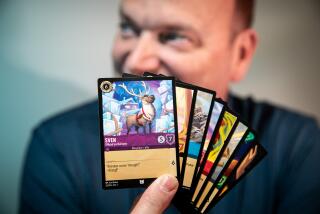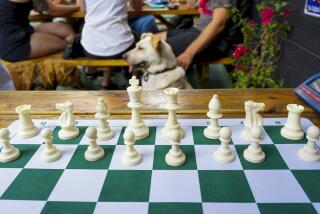THE GOODS : Some Card Games Worth the Gamble
- Share via
In blackjack, the idea is to beat the house. But what if the house is your house?
Gambling games are naturals for home computers, which with the right software program can shuffle and deal on-screen cards, spin a virtual roulette wheel and toss a simulated pair of dice.
Indeed, a number of skilled, amateur programmers have developed their own so-called shareware versions of gaming classics that are posted on on-line bulletin boards and networks so they can be downloaded for home use.
Blackjack is a particular favorite among commercial and home developers because it’s a relatively straightforward game that even those of us who rarely visit Las Vegas casinos (my fondest memories of the town are of the Liberace Museum and nearby Hoover Dam), can understand and enjoy, especially when not losing real money.
The fundamental rules call for the dealer to deal two cards for you and two for himself or herself. You peek at your cards and add up the value of your hand (all picture cards count as 10, an ace can be counted either as one or 11). Then you decide if you want additional cards.
The goal is to get close to a total hand value of 21. If you go over that total, you “bust” and automatically lose your bet. If you get closer to 21 than the dealer, you collect.
A “blackjack” is when you get a total of 21 with your first two cards (an ace plus a picture card or 10). Then you not only win, you also get paid a bonus.
We checked out six commonly available home computer blackjack games and ranked them from the worst to the best.
“Virtual Vegas” is not only the worst of blackjack programs we tested, it has to rank as one of the cheesiest pieces of software ever. This CD-ROM, from a company by the same name, seems to want to provide good game play, humor and titillation, but it strikes out on all three fronts.
Its unsophisticated game play is frustratingly slow, the sly comments made by on-screen female dealers (dressed in weird black outfits that seem to be a cross between dominatrix drag and flight attendant uniform) would be amusing only to a 14-year-old and the badly delivered double-entendres would have had Benny Hill crying out for a rewrite.
The CD-ROM, which can play in both Macintosh and Windows formats, lists for $29.95.
Much more fun to play is “Vegas Blackjack,” a shareware game for the Macintosh. Because it’s shareware, you can try it for free, but if you like the game and want to keep it, you’re honor-bound to mail the developer a fee--in this case, $15.
This program by Glenn Seeman offers quick play and handsome graphics.
Another $15 Mac shareware, “Blackjack Tutor” by Phil Miller, is not as good looking, but it does provide you with charts and other visual aids in case you want to get into the mathematical basis of the game to improve your strategy.
Finally in shareware for the Mac, Ed Trice takes game play another step forward with his “Blackjack Deluxe.” Although simple in its graphic design, it keeps track not only of your winnings, but also tells you how many hands you have won, lost or tied in a session. And when you pay the $25 fee, extra features are unlocked to help you learn card counting, the method pros use to keep track of what cards have been dealt between shuffles.
For Windows users, the commercial “Masque Blackjack,” developed by Masque Publishing, offers the smoothest and most interesting game play of all. This program, which lists for $39.95, demonstrates strategies and card counting in such an easy-to-grasp manner that I began to think about a change in careers.
I could hit the blackjack tables at night, leaving my days free for those repeat visits to the shrines of piano candelabra and water management.
Luckily, before I gave notice, I played several hands of “Masque Blackjack,” using the strategies it had taught me and its on-screen tutor function. After about 15 minutes, my initial stake of $900 was down to $300.
I’m keeping my day job.
* Cyburbia’s Internet address is Colker@news.latimes.com.



